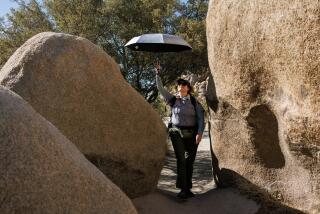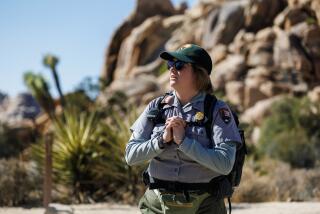Parkland Ranger Is Part Cop, Part Conservationist
- Share via
Greg Jackson is a federal law enforcement officer. But his day-to-day duties would more likely bring him face to face with a mountain lion than a bank robber.
Jackson, 42, is one of a dozen rangers who patrol 20,000 acres of protected mountains, grasslands and recreational trails in the Santa Monica Mountains National Recreation Area.
Typical duties include dealing with vehicles left in parking lots after hours or issuing citations to visitors with unleashed dogs. But on any given day, Jackson or his fellow rangers might encounter someone dumping trash or growing marijuana in the parklands.
“This is definitely a low-stress job that does have its moments,” said Jackson, who commutes 120 miles round-trip from his boyhood home in Long Beach, where he lives with his wife and two children.
The national recreation area, which has its headquarters in Thousand Oaks, encompasses about 150,000 acres of parkland under various jurisdictions that run from Ventura County to Hollywood.
And because the federal area abuts parks operated by other jurisdictions as well as private lands, rangers must ensure that visitors don’t trespass on private land to reach park sites.
“Our problems are generally with our interface with our neighbors,” Jackson said.
Rangers drive around all the navigable areas of the park to watch for poachers, check trail conditions or assist hikers.
“We’ll try to get up here this time of year five or six days a week,” he said. “Somebody’s got to take care of the parks.”
The federal park has trails designated for use by horses, bikes and pedestrians. But owners of motorized dirt bikes and all-terrain vehicles--which are illegal in the park--like to carve their own pathways into the hillsides. The landscape is scarred with these bootleg trails, and rangers are constantly battling with unauthorized riders.
When on patrol, Jackson drags large branches across the illegal trails to block riders or at least slow their journeys. Rangers also use fence posts and metal poles to block access. But the off-roaders always remove the obstacles, and the rangers continue to replace them.
“Pretty soon people are just going to get the point and give up,” Jackson said. “I hope.”
During the wet winter months, park maintenance crews plan to rake leaves over the trail scars. The weather and lack of use should allow grasses to grow and return the trails to normal.
In the meantime, rangers work with about 100 allies in a coalition of mountain bikers and equestrians who watch for illegal activities in the park and alert the rangers.
A ranger may be called upon to assist with an injured animal or participate in a search-and-rescue operation for hikers.
“We’ve got the land that people get lost on,” Jackson said. “I’m really surprised that we don’t have more searches than we do for missing people.”
The terrorist attacks changed the scope of the rangers’ jobs, and sometimes stretched the local work force thin. “After Sept. 11, we’ve had people out guarding dams,” he said.
Jackson said he never planned to be a ranger, much less a law enforcement officer. He graduated from USC with a degree in journalism, and worked as a copywriter for an advertising agency. When he was 26, he and his then-girlfriend went to a national park and had a fight. While Jackson was alone sulking, he saw a ranger drive by.
“He was the happiest-looking person I’d ever seen,” he said. Right there, Jackson decided to make a career move. “I thought that it would be less stressful, and it is.”
Jackson started out as a park interpreter, an official who offers help and information to the public.
He remembers the exact moment he decided to undertake the 12 weeks of training needed to take on the additional law enforcement responsibilities of a ranger.
After working two years as an interpreter in Utah’s Bryce Canyon National Park, he came upon a visitor who was feeding squirrels and advised the man to stop. The man shot back with an insult, and Jackson thought: “I’ve done all the interpreting I can do. This guy needs a ticket.”
In his 13 years as a ranger, Jackson said the extra tools of law enforcement have come in handy.
“People will poach anything. Some people steal snakes, frogs. Any type of reptile or amphibian we’ve got.”
Removing anything from the park, whether it’s an animal, plant or rock, is considered poaching under federal law. Some of the living species are rare or threatened, and the landscape contains important archeological materials.
“The difference between a national park and somebody’s vacant lot is that things here are protected, and they’re protected for a reason,” Jackson said. “Once the stuff is gone, it doesn’t come back.”
More to Read
Sign up for Essential California
The most important California stories and recommendations in your inbox every morning.
You may occasionally receive promotional content from the Los Angeles Times.










